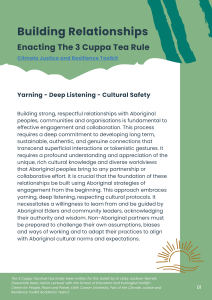1. Strong relationships for climate justice and disaster resilience
Relationship building and healing are central to climate justice and disaster resilience. Life on planet Earth requires balance within an interconnected web. Humans are interdependent in that we need to rely on a healthy ecosystem, and ecosystems and other species need caring humans to flourish. Humans also need each other to survive and live good lives and have (or need to) develop relationships through communities, institutions and laws/principles to ensure we do. However, in an age of capitalism and colonialism, caring relationships between people and the planet have not been as much of a priority as profit and resource extraction. Arguably, climate injustices are not merely the result of technical or market-based failures that have caused climbing emissions but also the result of relationship failures between people and between people and the planet.
Relationships based on respect, collective care, collaboration and reciprocity have been vital for survival on Earth. By continuing to nurture and restore these relationships, we can tackle the climate crisis and ensure justice and resilience endure across generations. The following sections consider why relationships are vital to every dimension of climate justice and can guide community service organisations in building strong relationships that enable transformative change and resilience.
2. Honouring diverse voices and experiences (recognitional justice)
At the heart of building resilient relationships is the recognition of the intrinsic worth of all people, living beings, and Country. Recognitional justice requires acknowledging the diverse voices, knowledge systems, and lived experiences that shape our collective journey toward climate justice. This dimension of climate justice goes beyond mere inclusion; it demands valuing each perspective as essential to the whole. Through genuine conversations—where people come together without the need to give or take—relationships evolve into shared understandings that honour the unique contributions of all.
Yarning, an informal yet focused dialogue practiced for millennia by Aboriginal and Torres Strait Islander Peoples, exemplifies recognitional justice. Yarning creates a space where participants are seen and heard without the pressure of conformity or quick conclusions. This practice reflects a deep commitment to learning from one another, cultivating empathy, and respecting the wisdom embedded in every voice.
3. The 3 Cuppa Tea Rule
4. Ensuring equitable participation (procedural justice)
Procedural justice underscores the importance of fairness in decision-making processes. It requires that all participants, whether individuals, organisations, or communities, have a genuine opportunity to contribute to decisions affecting them. In the context of climate justice, procedural justice means creating processes that are transparent, inclusive, and rooted in respect. Ultimately, this dimension of climate justice is all about building and sustaining relationships for collaboration and engagement.
A key part of procedural justice is understanding how much time it takes to build relationships and trust to enable effective collaboration and participation with people who have diverse lived experiences. Community service organisations must prioritise making time for building these relationships and consider how to sustain relationships and trust with communities when staff come and go. Moreover, organisations and staff should consider why communities may lack trust in or feel unsafe with certain services and organisations. For example, Christian organisations or religious venues may not feel inclusive for some communities, including LGBTQI+ and religious minority groups. Similarly, organisations who partner with extractive industries or military services may lose the trust of communities who have been harmed by them. Once trust is lost, community service organisations must work to change and then rebuild trust and safety in communities.
Deep listening is also a cornerstone of procedural justice. Deep listening is about allowing time for silence, reflection, and the organic flow of conversation. Listening is more than hearing; it is an act of humility. It is about setting aside preconceived notions and embracing the art of waiting—waiting to be invited into the conversation, and waiting for understanding to unfold. By adopting this practice, organisations and individuals ensure that all voices have the space to shape the future equitably, especially in climate resilience efforts. Organisations should consider how their processes and structures enable deep listening with the communities they serve.
5. Sharing (distributive justice)
Distributive justice is about the fair allocation of the benefits and burdens of climate change and environmental policies. It emphasises ensuring that communities who are disproportionately impacted by climate change receive equitable access to resources, support, and protection. This principle not only addresses the physical redistribution of resources but also fosters social and ethical responsibility and accountability. Building and nurturing strong relationships is integral to distributive justice, as it requires collaboration, trust, and accountability between governments, organisations, and communities.
Community service organisations must have relationships with communities (and listen to them) to understand what services and resources to distribute and how to allocate them fairly. They must learn to trust and respect communities’ experiences, knowledge and needs to act in solidarity with them, and they must develop a sense of collective responsibility to make climate justice a core part of their mission.
6. Nurturing mutual care and reciprocity (relational justice)
Relational justice highlights the interconnectedness of all life, advocating for relationships that are reciprocal, respectful, and nurturing. Building strong, authentic connections between people, organisations, and Country is essential for resilience. This dimension of climate justice calls for relationships grounded in care—where the focus is not on what can be gained but on how we can support each other.
Creating culturally and environmentally safe spaces enhances relational justice. Such spaces welcome the richness of diverse identities and foster belonging, allowing communities to thrive. By centring care and compassion, relational justice builds the trust necessary for sustained, collaborative action in the face of climate challenges.
7. Weaving past, present and future (intergenerational justice)
Intergenerational justice ensures that the wisdom of past generations informs present actions to secure a just future for those to come. This dimension of climate justice is deeply relational, requiring the cultivation of enduring connections that span time. It recognises that decisions made today must consider the well-being of future generations and the health of the planet.
In the context of relationships, intergenerational justice is nurtured through practices that embrace patience, continuity, and respect for historical knowledge. Yarning, deep listening, and creating spaces where the voices of Elders and young people alike are valued strengthen the web of connections needed to face climate adversity with resilience and wisdom.


